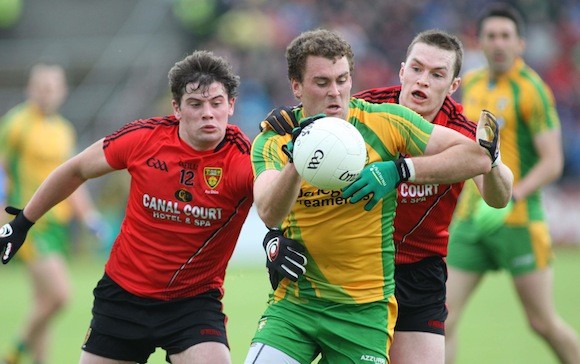Donegal GAA star Eamon McGee has said it is vital that Irish schools provide a safe environment for gay students.
The well-known sportsman was speaking at the launch of the LGBT Safe and Supportive Schools Project model.
The project is being run by BeLonG To and the HSE in an effort to create safe, supportive and fully inclusive schools for young lesbian, gay, bisexual and transgender students.
The project has been launched as a model in Co Donegal.
Gaoth Dobhair-based All-Ireland winner McGee said he hoped every school in the country adopted the model to ensure gay students are educated in a safe environment.
“I am delighted to be launching the LGBT Safe and Supportive Schools Project model. This provides a much needed model to protect all our young people in schools nationwide and I urge every school to take part in this important initiative.
“It is vital that schools are a safe environment for all our children and that they encourage growth and development in a supportive way. I am very proud that this has been piloted in Donegal and hope that it will provide a roadmap for other schools,” he said.
The project was established to develop and test a Whole School Community Model – a model that involved working with teachers, parents, students and the broader community to build a safe, supportive and inclusive environment for LGBT young people.
Its aim is to encourage schools nationwide to address homophobic/transphobic bullying through the use of the elements of the model and toolkit, which has been carefully evaluated as a result of this pilot project.
The project was delivered by BeLonG To and the Health Promotion & Improvement Department – Health and Wellbeing Division (HSE West), with the support of the two schools in the pilot scheme which ran during the 2013/14 academic year.
Staff from BeLonG To and HSE Health Promotion & Improvement provided whole staff workshops; specific training to SPHE teachers; information sessions for the Parents Associations, Boards of Management, and community organisations; access to resource materials; advice on policy development in keeping with the revised Department of Education Anti-Bullying Action Plan and Procedures; and ongoing telephone support.
The LGBT Safe and Supportive Schools Project was developed to help create schools that are fully inclusive of LGBT young people. The project is unique and innovative, both in national and international contexts, in that it:
Empowers schools to tackle homophobic and transphobic bullying in all its forms
Involves a whole-school community approach
Is jointly led by a voluntary and statutory agency
Spanned a full academic year
Involved whole staff training (teaching and non teaching) at participating schools
Involved a high level of access to the full school community over a twelve month period
Was rigorously tested through the administration of intensive questionnaires at four points over a twelve month period and through the use of ‘control’ schools.
Moninne Griffith, Executive Director of BeLonG To, said Many children first begin to realise that they are LGBT from an early age and these formative years can have a huge impact on their sense of self and future mental health as adults.
“The LGBTI Ireland study has shown that homophobic and transphobic bullying is a major cause of higher rates of self-harm, suicide and depression amongst LGBT young people and how important early intervention is, particularly in schools, to allow them reach their full potential and not suffer as so many have in the past. This program will ensure that schools are a safe place for future generations.”
Lisa O’Hagan, HSE, Co- Creator of project said homophobic and transphobic bullying unfortunately are still problems for young people in schools and communities across Ireland.
“The project had two key objectives, which are to increase teachers’ knowledge about this type of bullying, and their efficacy in responding to such issues. It seeks to enhance teachers’ skills in responding to and supporting LGBT young people who are ‘coming out’.
“It also aims to have a positive impact on students by increasing their knowledge of LGBT issues and engendering more positive attitudes towards LGBT young people. This, in turn, will impact on behaviour, in the form of rejecting and standing-up to homophobic and transphobic bullying.”
Tags:





